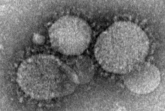An Illinois citizen who came in contact with the first Middle Eastern Respiratory Syndrome Coronavirus patient detected in the United States has tested positive for the virus, according to a statement from the Centers for Disease Control and Prevention on May 17.
"This latest development does not change CDC’s current recommendations to prevent the spread of MERS," Dr. David Swerdlow, who is heading the CDC’s response to the virus, said in the statement. "It’s possible that as the investigation continues others may also test positive for MERS-CoV infection but not get sick. Along with state and local health experts, CDC will investigate those initial cases and if new information is learned that requires us to change our prevention recommendations, we can do so," said Dr. Swerdlow.
The laboratory test results are "preliminary and suggest that the Illinois resident probably got the virus from the Indiana patient and the person’s body developed antibodies to fight the virus," according to the CDC statement.
The previously reported Indiana MERS patient recently had returned from Saudi Arabia when he met with a business associate in Illinois. Shortly after the meeting, the Indiana man was identified as having MERS. The business associate in Illinois, whom the CDC said has no history of travel to the Arabian Peninsula, was tested soon after. Initial results of the Illinois man’s test performed on May 5 were negative, but on May 16, he was found to have antibodies to MERS-CoV.
"At this time he’s reported to have had mild cold-like symptoms, but he did not seek or require medical care since exposure to the Indiana MERS patient. He is currently reported to be feeling well," Dr. Swerdlow told reporters during a CDC telebriefing . "Public health officials have advised him to remain in self-isolation until further tests are completed."
The investigation into the Indiana case is ongoing. "We don’t know exactly when people transmit [the virus]. We do know that the Indiana patient was having symptoms at the time of the interaction [with the Illinois man]", said Dr. Swerdlow.
To date, there have been two confirmed imported cases of MERS in the United States: The first in Indiana on May 2; the second in Florida on May 11.
MERS was first detected in Saudi Arabia in 2012, and has since spread through out the Arabian Peninsula. MERS typically presents in most patients as severe acute respiratory illness with symptoms of fever, cough, and shortness of breath. In some instances, the virus has spread from person to person through close contact. However, at this time, the CDC is not reporting evidence of sustained spread of MERS-CoV in community settings.
wmcknight@frontlinemedcom.com
On Twitter @whitneymcknight
